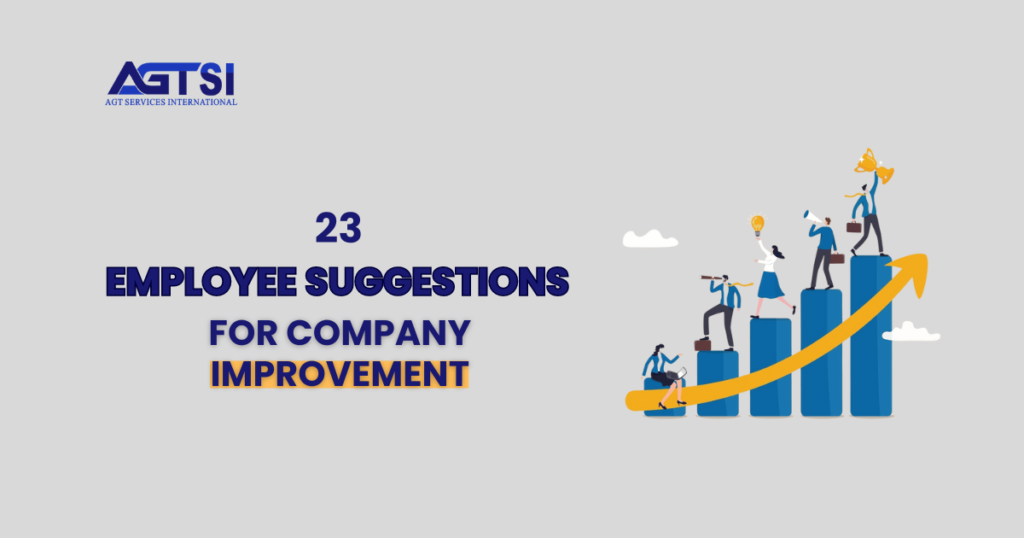Are you looking for employess suggestions for company improvement? No, looking further in this article, we will discuss suggestions by implementing these suggestions, companies can improve their performance. In today’s fast-paced business world, companies are constantly seeking to improve their operations, improve employee engagement, and stay ahead of the competition. Creating a facilitative environment that encourages growth, productivity, and innovation is key to achieving long-term success. Here are 23 practical employee suggestions for improving the company and becoming a better place to work.
23 Employee suggestions for company improvement
1. Prioritize RESPECT
In promoting a culture of respect within your company, it’s essential to focus on respectful relations at every level. Respect should serve as the foundation of your organizational values, guiding how employees communicate and collaborate with one another, regardless of their roles or seniority. When employees feel respected and valued, it greatly boosts morale and contributes to talent preservation. Respectful relations create a positive work environment where employees feel heard, appreciated, and motivated to contribute their best efforts. Respectful relations not only improve productivity and teamwork but also strengthen the overall fabric of your company’s culture, making it a more attractive and fulfilling place for employees to work.
Recommended: How to Calculate Manpower Utilization for Optimal Performance?
2. Define Clear Company Values
Setting clear company values is essential for creating a strong company improvement culture. Clear company values act as guiding principles, helping employees understand the company’s mission and priorities. Clear values of the company provide a sense of purpose, matching personal beliefs with organizational goals and promoting a deeper connection to the company’s mission. Additionally, defined clear values aid in decision-making by providing a consistent framework for actions and promoting unity, trust, and goodness within the organization.
3. Contribute Positively to the Community
Contributing positively to the community is a strategic suggestion for company improvement. Engaging in activities that create a positive impact, such as charity events or environmental projects, promotes goodwill and improves the company’s reputation. Contributing positively to community involvement also attracts top talent, especially among those who value purpose-driven work environments and companies with strong CSR initiatives. Additionally, it improves brand reputation, as consumers value businesses that focus on social responsibility and sustainability, leading to increased loyalty and positive word-of-mouth.
4. Set Explicit Goals
Setting clear goals for employees is one of the important suggestions for company improvement. Setting clear goals is important for effective organizational management, providing employees with clear objectives and expectations to match their efforts with company goals. Set explicit goals clarity improves productivity, employee focus, and progress tracking. Clear goals guide employees in focusing on tasks, assigning resources efficiently, and making informed decisions. Employees also promote better communication, collaboration, creativity, and innovation within teams, leading to improved performance and outcomes. Moreover, establishing key performance indicators (KPIs) and milestones allows organizations to monitor progress, identify areas for improvement, and drive continuous growth.
Recommended: Common Hiring Mistakes in Recruitment
5. Enhance Communication Channels
Effective communication channels are important for smooth collaboration and information exchange among employees, regardless of their location. Effective communication connectivity promotes teamwork, simplifies decision-making, and increases operational efficiency. Promoting open communication cultivates transparency, empowers employees to share ideas and feedback, and improves problem-solving and engagement. Clear communication guidelines minimize misunderstandings, encourage trust, and improve productivity. Additionally, prompt distribution of information through these channels keeps employees informed, matched with goals, and motivated to contribute to the company’s success.
6. Document Decisions Thoroughly
While discussing employee suggestions for company improvement, documenting decisions is an important suggestion for improving the productivity of company employees. Maintaining thorough documentation is required for organizational clarity and consistency. Document Decisions in Detail provides a reliable record for future guidance, training, and auditing. Comprehensive documentation ensures everyone understands protocols, reduces misunderstandings, and fosters accountability. Reviewing past decisions supports continuous improvement, while easy access to information improves efficiency and effectiveness.
Recommended: How Are Recruitment Agencies Solve Global Talent Shortages?
7. Encourage Employee Voice
Encouraging employee voice is key to a positive work environment and organizational improvement. Actively listening to ideas and feedback promotes engagement, motivation, and productivity. Valuing diverse views leads to innovation, transparency, and collaboration. Employee input drives continuous improvement, innovation, and competitive advantage. Use formal and informal channels to promote open communication and recognize valuable contributions.
8. Empower Employee Trust
Empowering trust among employees is crucial for a positive and productive workplace. Trust encourages commitment, initiative, and accountability, fostering a culture of ownership and responsibility. It also grants autonomy, boosting job satisfaction, confidence, and performance. Mutual trust between employees and leaders enhances transparency, reliability, and collaboration, strengthening organizational relationships and teamwork.
9. Apply Standards Fairly
Another employee suggestion for company improvement is to Follow standards objectively. Implementing fair standards is important for creating an honest and transparent work environment. Fairness promotes equal opportunities, improves morale, and reduces biases in performance evaluations. Transparent criteria based on measurable outcomes help identify top performers accurately and reward them effectively, boosting motivation and productivity across the organization.
10. Facilitate Career Progression
Facilitating career progression is essential for retaining talent, boosting motivation, and ensuring organizational success and company improvement. Clear advancement pathways show employees that their growth is valued, leading to higher retention rates and reduced turnover costs. Enforcing standards justly also promotes motivation, encouraging individuals to set goals and improve skills for better job satisfaction and productivity. Additionally, career progression initiatives contribute to talent development and succession planning, creating a pool of capable future leaders and ensuring organizational continuity.
11. Understand Employee Goals
Understanding employee goals is crucial for effective leadership and management and is also an important factor in employee suggestions for company improvement. Building personal connections allows leaders to modify tasks to match individual aspirations, maximizing performance and job satisfaction. Embracing employee goals fosters trust, open communication, and targeted guidance, leading to increased engagement and retention. Matching tasks with employee goals promotes purpose and fulfillment, improving productivity and fostering a culture of continuous learning and growth within the organization.
12. Update Training Materials
Updating training materials is important for keeping employees equipped with the latest skills and knowledge. In a rapidly evolving business landscape, it’s crucial to match training content with current trends, technologies, and methodologies. Refresh training materials to ensure that new hires receive relevant information and tools to succeed in their roles, encouraging adaptability and effective contribution to the organization. Regular updates also demonstrate a commitment to employee development, leading to higher engagement, satisfaction, and retention rates. Moreover, updated training materials improve training effectiveness and efficiency by ensuring content alignment with organizational goals and objectives.
13. Optimize Team Relationships
Optimizing team relationships involves creating various teams to promote collaboration and problem-solving. Diverse teams bring unique perspectives, skills, and ideas, leading to enhanced creativity and innovation. Collaborative environments promote open communication, mutual respect, and efficiency, resulting in increased productivity. Inclusive teams also boost morale, attract talent, and adapt well to change, making them agile and competitive in evolving business landscapes.
14. Promote Mentorship Programs
Mentorship programs are important employee suggestions for company improvement. Mentorship programs in organizations positively impact professional development, job satisfaction, and performance. Coaching Initiatives facilitate knowledge transfer from experienced mentors to new hire employees, helping employees gain insights, improve skills, and effectively guide challenges. Mentorship programs also offer personalized guidance and support for skill development, leading to improved job performance. Furthermore, mentorship programs foster career growth by providing career insights, networking opportunities, and mentor-driven career planning, contributing to increased job satisfaction and retention.
15. Implement Performance Assessments
Implementing performance assessments is essential for organizations aiming to improve employee performance, encourage professional growth, and effectively meet organizational objectives. Performance assessments involve regular evaluations of individual and team performance, offering valuable feedback to employees and managers.
One significant aspect of performance assessments is providing constructive feedback to employees, highlighting strengths and areas for improvement. Constructive feedback helps employees better understand their skills, address weaknesses, and desire for continuous improvement.
Performance assessments also help identify areas for organizational improvement by assessing performance against goals and benchmarks. This proactive approach allows companies to address challenges promptly, optimize performance, and drive success.
Additionally, performance assessments provide a platform for recognizing and rewarding achievements. Performance acknowledgment reinforces positive behaviors, boosts morale, and fosters a culture of appreciation.
Regular performance assessments also facilitate ongoing communication and collaboration, matching individual objectives with organizational goals, improving engagement, and supporting talent retention.
Recommended: Employee Skills Assessment Uncovered
Recommended: Customized Talent Assessments
16. Add Fun to Workdays
Injecting fun into workdays is a great way to boost morale, foster teamwork, and create a positive work environment. Activities like team-building exercises and designed events help employees relax, bond, and recharge, leading to increased motivation and productivity. Recognition programs that acknowledge employees’ efforts also add a fun element while boosting morale and job satisfaction. Prioritizing fun at work creates a vibrant environment where employees feel valued and engaged, contributing to overall success.
17. Provide Competitive Pay
Offering competitive pay is essential for attracting and retaining top talent. Extend Attractive Salaries include elements like base salary, bonuses, benefits, and perks. Regularly reviewing and benchmarking payments ensures it remains attractive. Fair pay acknowledges employees’ value, fostering a culture of recognition and commitment. It also plays a key role in retention, morale, and overall job satisfaction, leading to higher productivity and engagement.
18. Express Gratitude Sincerely
Expressing sincere gratitude is a powerful way to acknowledge and appreciate employees’ efforts. Demonstrating true gratitude promotes a positive work environment, boosts morale, and motivates continued excellence. Genuine gratitude can be conveyed through verbal praise, written notes, public recognition, or personalized gestures. When employees feel valued and recognized, it strengthens their bond with the organization, leading to increased satisfaction, loyalty, and engagement. Offer heartfelt thanks positive feedback loop promotes a culture of excellence and continuous improvement.
Recommended: 10 Practical Steps to Increase Recruiter Productivity
19. Recognize Achievements Openly
Recognizing achievements is a powerful way to boost morale and inspire excellence within an organization. Recognizing individuals or teams for their achievements not only validates their efforts but also motivates others to excel. Recognizing achievements as positive support fosters a culture of recognition, innovation, and collaboration, contributing to increased job satisfaction, productivity, and loyalty among employees. Celebrating successes showcases the organization’s values and priorities, improving its brand reputation and attracting top talent. Custom revelations, whether through awards, social media, or team events, create a culture of appreciation and mutual respect, driving continuous growth and success.
20. Promote Work-Life Balance
Promoting work-life balance is important for a healthy workplace. Employers can achieve this by offering flexible schedules and wellness programs and supporting personal well-being. Flexible work hours and remote options help employees manage their time, reducing stress. Wellness initiatives, like fitness classes and mental health support, show commitment to employees’ well-being. Providing resources for stress management and self-care further supports work-life balance. These efforts lead to motivated, engaged, and loyal employees, boosting productivity and improving the company’s reputation.
21. Embrace Diversity and Inclusion
Embracing diversity and inclusion promotes a culture of belonging and equal opportunities in the workplace. To drive innovation and success, promote diversity and inclusion by valuing unique perspectives, backgrounds, and talents. Leadership commitment, inclusive policies, training, and feedback mechanisms are crucial in creating an environment where everyone feels respected and empowered to contribute their best. Employee resource groups and mentorship programs further promote diversity, inclusion, and equity within the organization.
Recommended: Top Social Media Recruiting Tools
22. Champion Psychological Safety
Emphasizing psychological safety in the workplace is essential for creating a positive, productive environment. Champion psychological safety encourages open communication, idea-sharing, and collaboration, leading to innovation and better outcomes. A psychologically safe workplace fosters trust, respect, and personal growth among employees, requiring clear communication channels, a culture of inclusivity, and supportive leadership behaviors.
23. Dedicate to Continuous Improvement
Committing to continuous improvement is essential for a successful organizational culture. Dedication to constant improvement involves regularly reviewing processes, seeking feedback, and adapting to change. By adopting innovation and learning, companies stay competitive, streamline operations, and capitalize on new opportunities. Focus on continuous improvement commitment requires open communication, leadership support, and a culture that values growth and progress at all levels.
By implementing these actionable suggestions, your company can transform its culture, enhance employee engagement, and drive sustainable growth. Remember, a company is only as strong as its people, so investing in your workforce is crucial for long-term success.




















